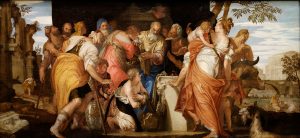Tuesday, January 18, 2022 (today’s lectionary)
Choose this day whom you will serve
Samuel, with the horn of oil in his hand, anointed David in the midst of his brothers; and from that day on, the Spirit of the Lord rushed upon David.
Glancing through Google I realize that “the Spirit of the Lord rushes upon” you when you feel God’s calling and follow it. If your hair is drizzled with holy oil, all the better.
I have found David my servant; with my holy oil I have anointed him, that my hand may be always with him, and that my arm may make him strong.
But the calling is what counts. It could be God’s calling for a day, or an hour, or a lifetime. David became King of Israel, but before that he killed Goliath (see tomorrow’s lectionary), became Saul’s friend and then his enemy, learned to love Saul’s son Jonathan, and married Saul’s daughter Michal. After he became king David spun from one day’s glory to the next day’s catastrophe. At times he was God’s obedient servant; at other times he followed his own way.
God does not see as man sees. The Lord looks into the heart. May the Father of our Lord Jesus Christ enlighten the eyes of our hearts, that we may know what is the hope that belongs to our call.
I grew up in central Illinois, surrounded by fields of corn, soybeans, wheat and oats. I have a fond memory of rolling in a neighbor’s wheat field with my girlfriend Nancy, as we romanced each other in our own innocent way. Like my neighbor’s, the wheat field Jesus and his disciples walked through would have been worse for wear by the time they made it through.
His disciples began to make a path while picking the heads of grain.
There’s always a dusty feel to a field of ripe wheat. The stalks sing in the wind, and tickle your thighs when you’re walking through them. In the sunshine the wheat smells raw, ripe and somehow ready to eat. The disciples agreed, of course, and Jesus led them in their accidental feast.
Where did the Pharisees come from anyway? I guess they were walking with Jesus and the disciples on this sabbath Saturday. Wherever they came from they were upset with Jesus for giving his friends permission to eat. The disciples had violated at least four of the thirty-nine Melachot (working) prohibitions: reaping, threshing, winnowing, and selecting, and Jesus said nothing. They were not stealing, because plucking heads of grain out of someone else’s field was legal EXCEPT on sabbath. They were not breaking one of the ten commandments, but they were violating oral, rabbinical Law.
Jesus made this a teaching opportunity, you might say, when he compared himself to David.
Have you never read what David did when he was in need and he and his companions were hungry?
David clearly broke the law, but the Pharisees revered him. The disciples’ behavior was much more ambiguous. Jesus wants the Pharisees to see this new testament to God through the same lens through which they saw the old.
Then Jesus made two more important points.
The Sabbath was made for man, not man for the sabbath.
God’s unending and unconditional love for his children prompted him to create the sabbath, and the Pharisees had forgotten that.
That is why the Son of Man is lord even of the sabbath.
The Pharisees did not agree, but as Creator, Jesus was the original Lord of the Sabbath and so knew better than the Pharisees how the sabbath should be kept. There was no middle ground for the religious leaders. They could accept Jesus as God, or reject him. They had to choose.
So, of course, do we.
(1 Samuel 16, Psalm 89, Ephesians 1, Mark 2)
Painting by Paolo Veronese, The Anointing of David, 1555 (Kunsthistorisches Museum, Vienna)
(posted at www.davesandel.net)
#
